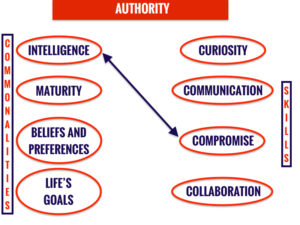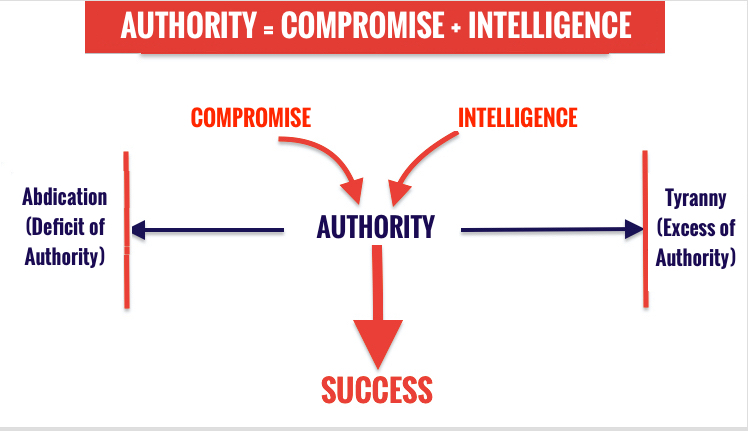Authority is defined in the dictionary as "the power or right to give orders, make decisions, and enforce obedience." It is inherent in a 1:1 ratio with the Responsibility one has taken on. The nature of this term is seen as being of appeal as a trait in a partner which one needs if they are more of a thinking and feeling type person, as opposed to a "do-er." It is a character trait and virtue that you want, when you see yourself desiring a partner with a "take charge attitude." Authority is a combination of the Skill of Compromise with the trait (or Commonality) of Intelligence.
C
For example, it would be a difficult compromise to find a way for a female Manhattan Attorney to align with a male cowboy from Nebraska, if neither wanted to relocate. However, if one of them didn't mind, they might compromise on living in relatively rural New Jersey, close enough to still commute daily to Manhattan for her part.
Authority, in having the trait of intelligence combined with the skill of compromise, takes the intelligence not as a direct execution of action, but of having the know-how and competence to do so. Which makes Authority more of a feature of a partner who "always knows what to do," or "always has a solution," regardless of who eventually takes decisive action. It is one of the most dearly held wishes to discover in a mate that they "always know what to do."
We might be reminded of the usefulness of the diagram on the personal boundary of a committed relationship, in intellectual attraction, where the middle segment in the ratio of Phi (1.618...) approximates perfection in the balance between efforts at one's personal life and dreams, versus the intimate space and shared dreams between them.
What makes Authority unique as a character virtue, is that it addresses the emotions, and the gender instincts. We may clearly see examples of how personality style may also align with the higher-brained notion of a mature character virtue, here. For example, if one were a Lover Personality, low on confidence at some areas of life, it can be very reassuring to be with a person who has a great deal of certainty and competence about what they set as personal and joint goals. There can be a relaxation of anxiety for the Lover in having this kind of partner, with this virtue. So, for the personality of a Warrior, we may see that Authority as a character virtue may work hand in hand, naturally, with such a personality, amplifying itself with satisfaction in performing one's natural gift for leadership and precise, directive actions.
At the reptilian level, we might also see a male with the prominent character virtue of Authority having a seemingly unlimited supply of "take charge" utility and helpfulness toward a woman of interest, who may become a prospective partner, even if she, herself is a very accomplished leader. This speaks to the sexual attraction between them in Step 2 of courtship, "Ladies and Gentlemen," where the man "lets the woman know he likes her" through doing such "fatherly" things as assisting her on some tasks, or taking over responsibility for some of their duties the way a kind father to a daughter might. Yes, even if her personality style is one of the Warrior and she is a CEO, she might find herself unconsciously, automatically attracted to his willingness to help out with the know-how and action that is built into Authority as a character virtue. It amplifies her reptilian-brained femininity, even if she very easily could "do the thing for herself."
Through combining compromise with intelligence, Authority links the higher brain to both the mammalian brain (giving confidence and encouragement to the partner) as well as the reptilian brain through being a character virtue that either amplifies femininity in the partner through giving assistance and lightening the load toward achieving a goal, or else amplifies the masculinity in the partner through expressing that the use of the Authority is a gift to the man's goals, by the woman (alongside the Hera Instinct in her, which amplifies the Zeus Instinct in him - Hera's gift to Paris from the Temptation of Paris being, "dominion over the world.")
And so, some of the character virtues such as Authority, weave together the workings of not only the higher brain with the reptilian brain, but also with the mammalian brain. We may see the Triune Brain Model, now, as an intricate tapestry, following each individual strand from its origin to its connection to other romantic functions.

The vice of deficit for Authority is called, "Abdication," which is in essence, surrender of one's own personal goals and dreams in service of the relationship's survival, again seen in codependence, and perhaps facilitated by the less balanced, more fearful Lover or King/Queen personalities. When it comes to life's goals and your dreams, it doesn't make sense to accept dominance, possessiveness and tyranny from a partner, and so the one experiencing the vice of Abdication, self-sabotages in a way that also sabotages the relationship, while being abdicating as a partner, also directly causes joint goals to fail, such as in passive-aggressiveness. Abdication toward a potential partner is similar to the common phrase that partners say of each other: "He 'sold me out."" Or "She bailed on me," or "turned against me" at the first sight of trouble.
These features show the vice in some relationships that pertain to the deep meaning of loyalty, and even of the many ways that modern couples tend to ignore or violate their own marriage vows - limits and agreements originally considered to be sacred and sacrosanct.
We might often see a couple have a falling out, because they can see, hear and feel the deep level of disloyalty in abdication and tyrrany as vices, when instead, we needed their Authority as a virtue - something that can only come from a mature, constructive place, characterized by a "win/win" attitude and actions in the partnership.
Authority has bearing on our performance in phase three - intellectual attraction - step eight, where we seek to amplify the best virtues toward our goals. It is what causes us to see our mate as "a rock" in our lives, and us to feel safe in being with them.

